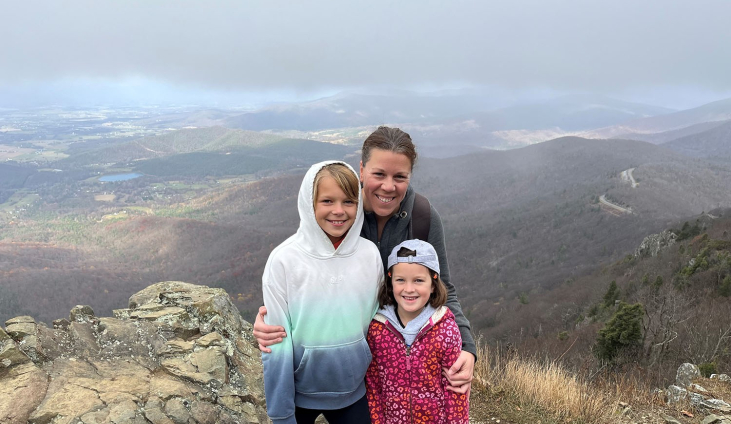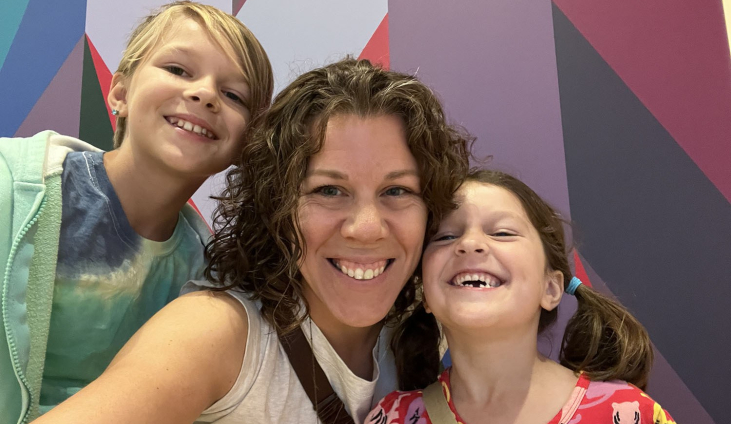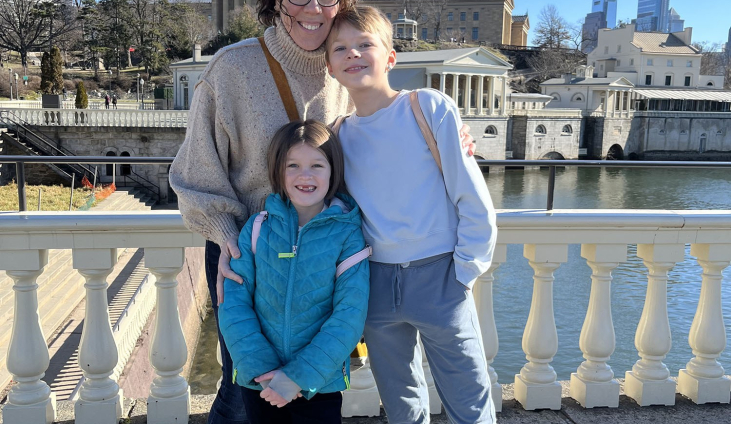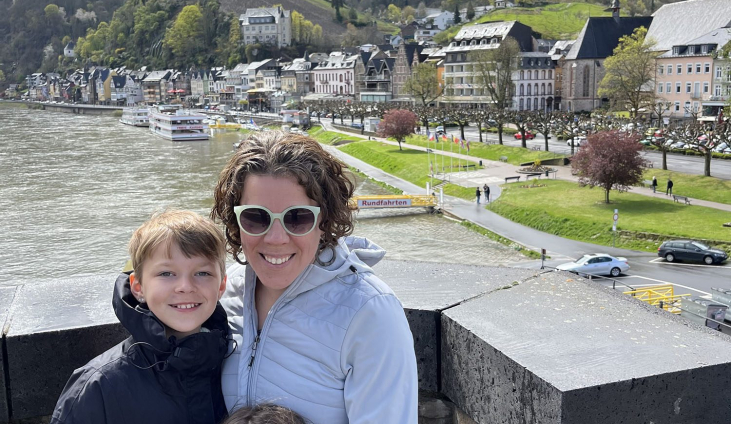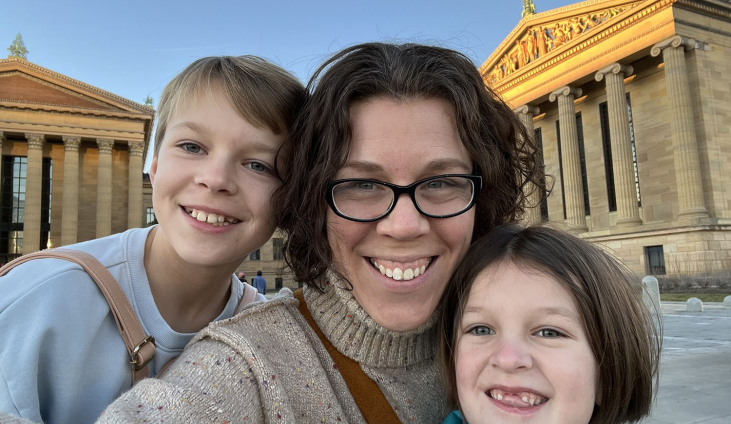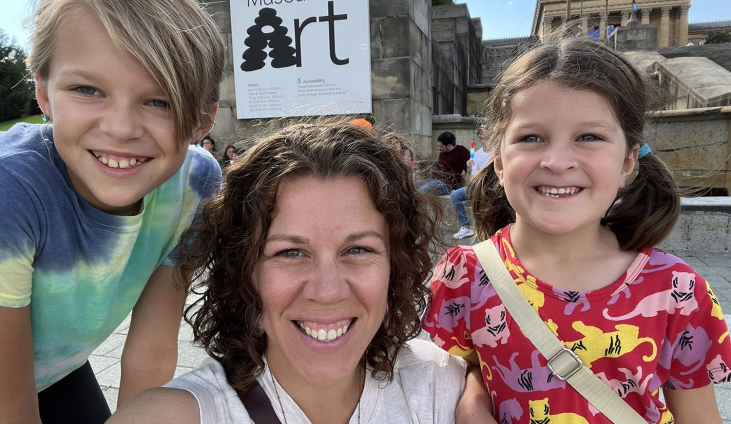With an unwavering commitment to the alignment of people and mission, Kristy operates at the intersection of observation, adaptation, and continuous system improvement. Read on to learn about Kristy’s philosophy on organization culture, the word “family,” and other HR hot takes.
The way we work has fundamentally changed since 2017 when you started at the Science Center. How has this shift changed your role?
I could talk about this for a very long time, and frankly, it is the way I’ve always approached my work. I learned as a young adult that not only am I comfortable with change, I am motivated by change.
To summarize: My role at the Science Center has always been about ensuring that the organization meets its mission through its people and culture (more about that below). I don’t see that changing. But obviously, the people and culture themselves change. Shift and evolution are part of being alive- in the world, in an organization, as individuals. To remain impactful, we have to respond to that shift, or even better, anticipate where it’s going next. I don’t even know if I’m explicitly aware of every time I make a shift. It comes in the form of observing, adjusting and changing systems to meet the needs.

The Science Center transitioned its Human Resources function
to People and Culture a few years ago. What was the impetus for doing
this?
This was more of a slow transformation in thought rather
than anything sparked by any particular moment or decision. The words
we use matter to the environment we create, and while “HR” is a widely
recognized moniker, it also comes with a lot of connotations that are
limiting and not well suited to the Science Center. Ultimately, “People
and Culture” is a more direct description of the focus of the role and
team. Our role is to ensure that the people and culture of the
organization are set up to meet the mission, and by using the words
“People and Culture” in the name of the function, it keeps that front
and center.
What accomplishment are you most proud of in your tenure at the Science Center?
The way I would answer this question is that I’m really proud of the
work we as an organization have done over the past few years on our
culture. Identifying our values, tweaking them, working on infusing
them. Aligning the culture with the Strategic Plan, striving to infuse
DE&I into our culture and not just make it an initiative, etc. The
list goes on and I think it boils down to the fact that this is an
organization that is dedicated to ensuring that we are authentically
approaching our mission.
Give us a human resources hot take.
I have more of these than I would like to admit. For years, I’ve been saying in whatever organization I work for, “We are not a family! We are an organization and an engaged team, and that is the level of commitment that I believe is healthy in an organization.”
But If I’m honest about what has been occupying my mind lately about
the industry in which I work, this is it: I’ve been thinking a lot about
the prevailing thoughts and conversation around what makes good
leadership and organizations. In my opinion, much of the discussion in
this space is oversimplified to make it digestible and easy and I think
that has done the world of organizational development and leadership a
great disservice. The soundbites have boiled leadership down to
describe it as something warm and palatable, but I think real leadership
is complex and takes different forms that may be exactly what a system,
team, or organization needs. Real leadership means that decisions are
being made that are in the best interest of a system, team, or
organization, even if it isn’t welcome. That may seem obvious, but I
don’t know that everyone understands how that may actually play out and I
don’t think it’s dominating the conversation about leadership and
organizational development. In my experience, I’ve learned and observed
it takes a lot of care to lead an organization or team with vision,
insight, and mindfulness while being willing to be misunderstood and
trust that it’s still what’s best for the team even if you aren’t seen
for it. And to be clear, I’m talking about leadership in many forms and
levels, not just as we traditionally think about it.

What gets you out of bed in the morning and what keeps you up at night?
I am a heavy sleeper so not much keeps me up or wakes me up unless I’m
intentionally spending my time on it. 😊 In truth, over the past year
or so, I’ve become more self-aware about how much my mind is constantly
working on the things I want to change at the Science Center, in my
personal life, or in the world. I’ve always assumed I’m a verbal
processor (and I am), but I’ve assumed incorrectly that means much of my
thinking is done out loud. Lately I’ve become aware, through reflection
by myself and with other trusted people in my life, that I do an
enormous amount of thinking quietly, internally and pretty constantly. I
have started to think about an image of my mind as soil with all these
little ideas and thoughts sprouting. When one is ready to blossom,
that’s when I become an external processor.
What is your superpower?
Systems thinking. I
regularly and subconsciously scan and observe environments and dynamics
to learn what they mean to improve and change the system. I can see
where we are going (if I believe in it) and can form a pretty clear map
in my mind of how to structure and move to get there. My lesser-known
superpowers include making a number of homemade sauces and jams and
playing a pretty mean game of ping pong. I did a pretty good job of
keeping that last one under wraps until an annual staff outing where my
intensity for ping pong was on full display.
Favorite thing about living in the Philadelphia region?
In general, I appreciate where and how Philly is situated- geographically as well as theoretically. Specifically, my kids and I have really been enjoying museums lately, particularly the art museums. We have been finding real joy in exploring Philly’s rich culture that I continue to appreciate more and more.

